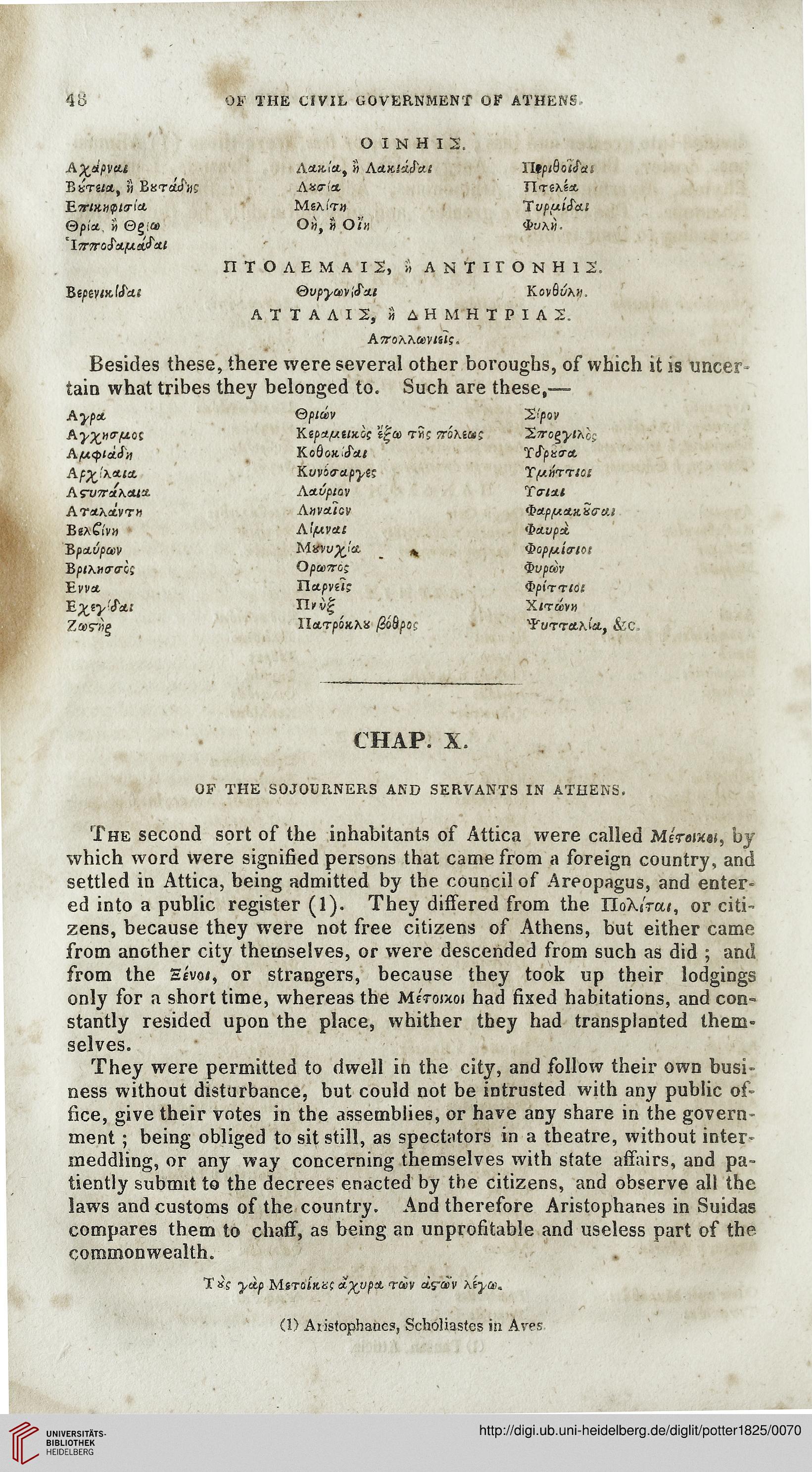4tf
Of the civil government of athens
o i n h i 2,
A%ctpv&l Addict, » Aa.KtiS'a.t lUpiQdtfcti
BisTS/a, » Estops Ava-ia. TTtsxsa
~SLiriKti<pi<rM MexiVx Tupui&'cLi
Qpict ,8 0§:O> Oi, » O/m
n T O A E M A I 2, m ANTirONHll
BipivtKltS'ctl Qvpymfini KovQuxy.
A T t A A I 2, 8 AHMHTPIA2.
A:toam»vmj;.
Besides these, there were several other boroughs, of which it is uncer-
tain what tribes they belonged to. Such are these,—
Aypct Qpiciv Xlpov
Kyyyivpat Kipa/uiixi; t^a> t>k 7rohiu; ~2.7rcgylXo;
Afx^itaSif Ko&oK'int Tfpzrtt
Ap^.Kttia. Kuvixrapyes TfAHrrtoi
Ajwra^amc Actvpiav Tfl7at<
Ar*XotvT« Antsuov <5>mp/uxKS<rai
BexCi'vw AlftvcLi <ictvpi
~Bpcujpa>v Mtfvu^i'tt. % <bop/jLt(rlt>t
Hpt\>t<r<rU Opa>7ro; $vpcov
Evva. Tlxpvfi; i'piTTtoi
'E^y'S'at Tlrvg Xitcovyi
CHAP. X.
of the sojourners and servants in athens.
The second sort of the inhabitants of Attica were called Miretxn, by
which word were signified persons that came from a foreign country, and
settled in Attica, being admitted by the council of Areopagus, and enter-
ed into a public register (1). They differed from the noAiVaf, or citi-
zens, because they were not free citizens of Athens, but either came
from another city themselves, or were descended from such as did ; and
from the Sivoi, or strangers, because they took up their lodgings
only for a short time, whereas the MeVoixoi had fixed habitations, and con-
stantly resided upon the place, whither they had transplanted them-
selves.
They were permitted to dwell in the city, and follow their own busi-
ness without disturbance, but could not be intrusted with any public of-
fice, give their votes in the assemblies, or have any share in the govern-
ment ; being obliged to sit still, as spectators in a theatre, without inter-
meddling, or any way concerning themselves with state affairs, and pa-
tiently submit to the decrees enacted by the citizens, and observe all the
laws and customs of the country. And therefore Aristophanes in Suidas
compares them to chaff, as being an unprofitable and useless part of the
commonwealth.
T «; yap Mstojicbc ot^u/>*• fciiv ctr^v Myon.
(I) Aristophanes, Scholiastes in Aves
Of the civil government of athens
o i n h i 2,
A%ctpv&l Addict, » Aa.KtiS'a.t lUpiQdtfcti
BisTS/a, » Estops Ava-ia. TTtsxsa
~SLiriKti<pi<rM MexiVx Tupui&'cLi
Qpict ,8 0§:O> Oi, » O/m
n T O A E M A I 2, m ANTirONHll
BipivtKltS'ctl Qvpymfini KovQuxy.
A T t A A I 2, 8 AHMHTPIA2.
A:toam»vmj;.
Besides these, there were several other boroughs, of which it is uncer-
tain what tribes they belonged to. Such are these,—
Aypct Qpiciv Xlpov
Kyyyivpat Kipa/uiixi; t^a> t>k 7rohiu; ~2.7rcgylXo;
Afx^itaSif Ko&oK'int Tfpzrtt
Ap^.Kttia. Kuvixrapyes TfAHrrtoi
Ajwra^amc Actvpiav Tfl7at<
Ar*XotvT« Antsuov <5>mp/uxKS<rai
BexCi'vw AlftvcLi <ictvpi
~Bpcujpa>v Mtfvu^i'tt. % <bop/jLt(rlt>t
Hpt\>t<r<rU Opa>7ro; $vpcov
Evva. Tlxpvfi; i'piTTtoi
'E^y'S'at Tlrvg Xitcovyi
CHAP. X.
of the sojourners and servants in athens.
The second sort of the inhabitants of Attica were called Miretxn, by
which word were signified persons that came from a foreign country, and
settled in Attica, being admitted by the council of Areopagus, and enter-
ed into a public register (1). They differed from the noAiVaf, or citi-
zens, because they were not free citizens of Athens, but either came
from another city themselves, or were descended from such as did ; and
from the Sivoi, or strangers, because they took up their lodgings
only for a short time, whereas the MeVoixoi had fixed habitations, and con-
stantly resided upon the place, whither they had transplanted them-
selves.
They were permitted to dwell in the city, and follow their own busi-
ness without disturbance, but could not be intrusted with any public of-
fice, give their votes in the assemblies, or have any share in the govern-
ment ; being obliged to sit still, as spectators in a theatre, without inter-
meddling, or any way concerning themselves with state affairs, and pa-
tiently submit to the decrees enacted by the citizens, and observe all the
laws and customs of the country. And therefore Aristophanes in Suidas
compares them to chaff, as being an unprofitable and useless part of the
commonwealth.
T «; yap Mstojicbc ot^u/>*• fciiv ctr^v Myon.
(I) Aristophanes, Scholiastes in Aves





